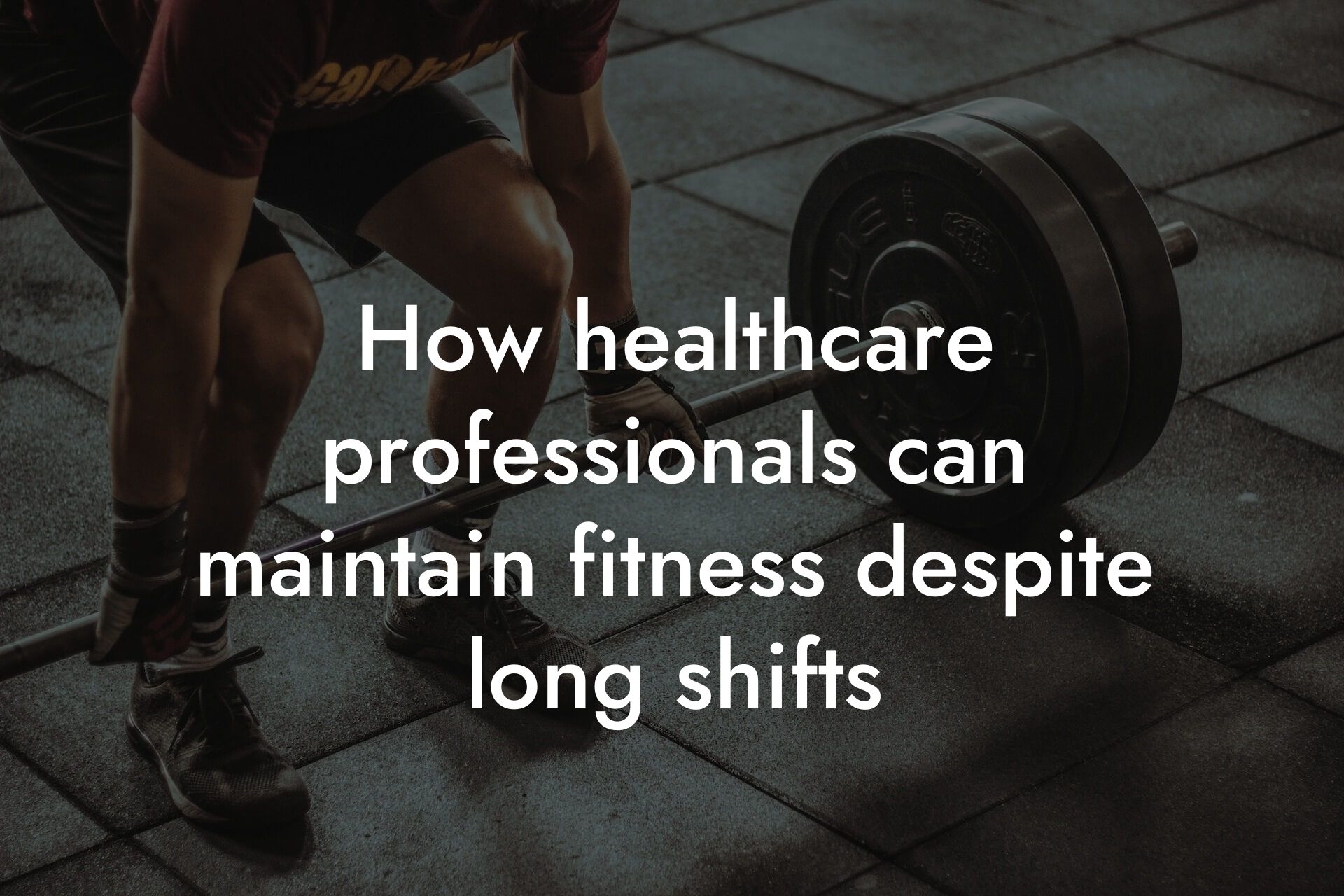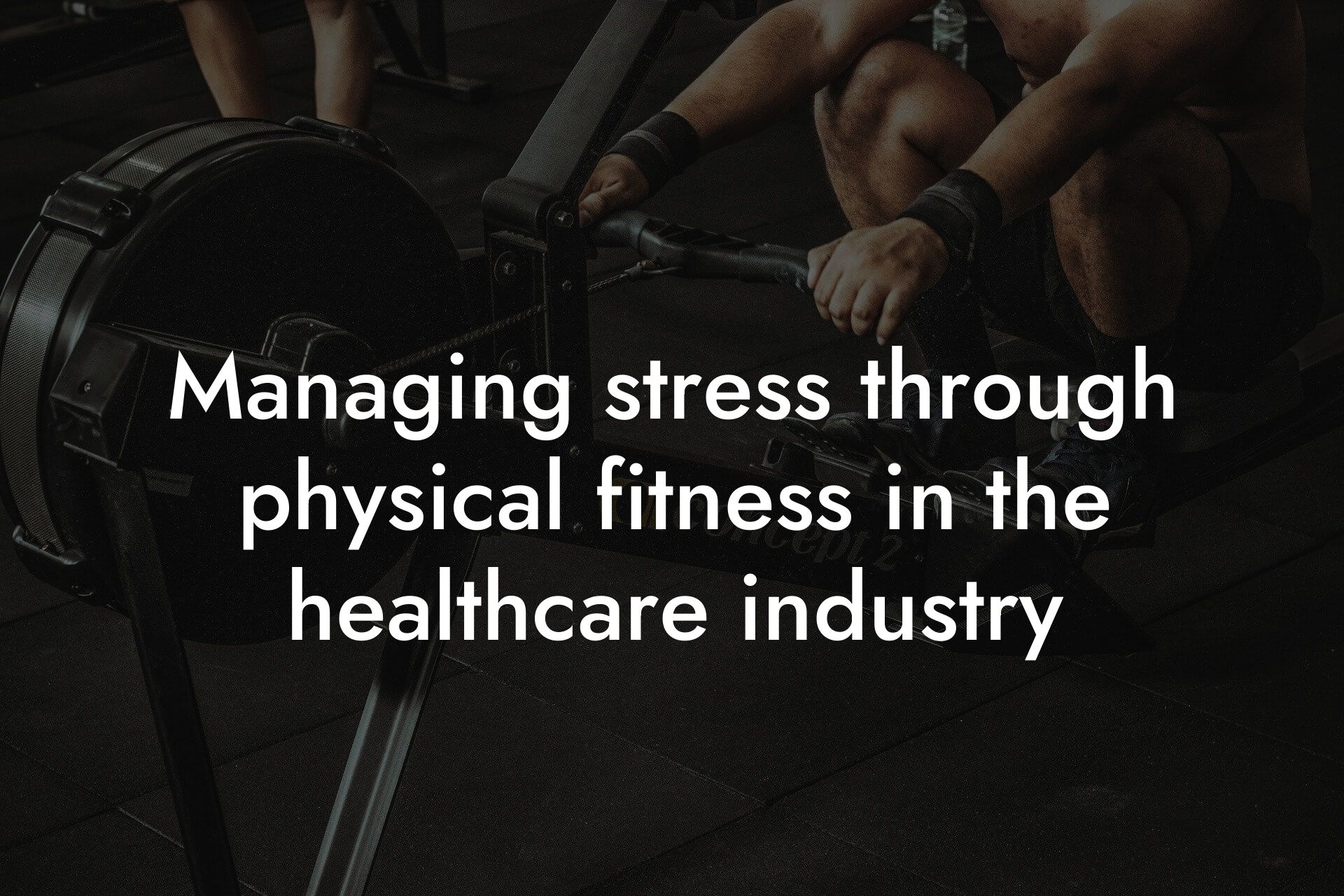As a healthcare worker, you know the demands of your job all too well. Long hours, high-pressure situations, and constant exposure to germs and viruses can take a toll on your physical and mental health. However, it's essential to prioritize your fitness to maintain the energy and resilience needed to provide top-notch care to your patients. The good news is that you don't need an hour-long gym session to reap the benefits of exercise. Quick workouts, tailored to your busy schedule, can be a game-changer.
Table of Contents
- The Importance of Fitness for Healthcare Workers
- Challenges Faced by Healthcare Workers
- Benefits of Quick Workouts for Healthcare Workers
- Designing a Quick Workout Routine for Healthcare Workers
- Sample Quick Workout Routines for Healthcare Workers
- Incorporating Quick Workouts into Your Busy Schedule
- Frequently Asked Questions
The Importance of Fitness for Healthcare Workers
Fitness is not just about aesthetics; it's a critical component of overall health and well-being. Regular exercise can help reduce stress, boost mood, and increase energy levels. As a healthcare worker, you're more likely to encounter physically demanding situations, and being fit can help you respond more effectively. Moreover, exercising regularly can also reduce the risk of chronic diseases, such as heart disease, diabetes, and some types of cancer.
Challenges Faced by Healthcare Workers
Healthcare workers face unique challenges that can make it difficult to prioritize fitness. Irregular schedules, long shifts, and high-stress environments can disrupt even the best-laid fitness plans. Additionally, the emotional toll of working in healthcare can lead to burnout, making it harder to muster the motivation to exercise. It's essential to acknowledge these challenges and develop strategies to overcome them.
Benefits of Quick Workouts for Healthcare Workers
Quick workouts can be a lifesaver for healthcare workers with tight schedules. These short, intense sessions can:
- Improve cardiovascular health
- Increase strength and flexibility
- Enhance mental clarity and focus
- Reduce stress and anxiety
- Boost energy levels
- Fit into even the busiest of schedules
Designing a Quick Workout Routine for Healthcare Workers
When designing a quick workout routine, consider the following principles:
- Focus on compound exercises that work multiple muscle groups at once
- Incorporate high-intensity interval training (HIIT) to maximize calorie burn and efficiency
- Prioritize exercises that can be done with minimal equipment or in a small space
- Aim for 20-30 minute sessions, 2-3 times a week
- Listen to your body and rest when needed
Sample Quick Workout Routines for Healthcare Workers
Here are three sample quick workout routines that can be adapted to your schedule and fitness level:
**Routine 1: Bodyweight Blast**
- 5-minute warm-up (jogging in place, jumping jacks, etc.)
- 3 sets of 10 reps: squats, push-ups, lunges, planks
- 5-minute cool-down (stretching)
**Routine 2: HIIT Circuit**
- 5-minute warm-up (jogging in place, jumping jacks, etc.)
- 3 rounds of 30 seconds of exercise + 30 seconds of rest:
- Burpees
- Mountain climbers
- Jumping jacks
- Plank jacks
- 5-minute cool-down (stretching)
**Routine 3: Resistance Band Workout**
- 5-minute warm-up (jogging in place, jumping jacks, etc.)
- 3 sets of 10 reps: banded squats, banded chest press, banded rows, banded shoulder press
- 5-minute cool-down (stretching)
Incorporating Quick Workouts into Your Busy Schedule
To make quick workouts a sustainable part of your routine, try the following strategies:
- Schedule workouts during your lunch break or between shifts
- Find a workout buddy or accountability partner
- Invest in a fitness tracker or app to track progress and stay motivated
- Prioritize self-care and rest when needed
As a healthcare worker, your fitness is crucial to your overall well-being and ability to provide top-notch care to your patients. Quick workouts can be a powerful tool in your fitness journey, offering a convenient and effective way to prioritize your health amidst a busy schedule. Remember to listen to your body, stay consistent, and celebrate small victories along the way. By incorporating quick workouts into your routine, you'll be better equipped to tackle the demands of your job and maintain a healthy, thriving lifestyle.
At Tano Performance Group, we understand the importance of fitness for high-earning professionals like yourself. Our DEXA machine provides a comprehensive body assessment, giving you the insights you need to take your fitness to the next level. Contact us today to learn more about how our services can support your fitness journey.
Frequently Asked Questions
What are the benefits of quick workouts for healthcare workers?
Quick workouts can be a game-changer for healthcare workers with tight schedules. Not only do they improve physical health, but they also boost mental well-being, increase energy levels, and enhance overall job performance. By incorporating quick workouts into their daily routine, healthcare workers can reduce stress, improve sleep quality, and increase their resilience to the demands of their job.
How can I fit a workout into my busy schedule as a healthcare worker?
Fitting a workout into a busy schedule can be challenging, but it's not impossible. Start by identifying small pockets of time throughout your day, such as during breaks or before/after shifts. Even 10-15 minutes of exercise can be beneficial. You can also consider exercising during your lunch break or finding a workout buddy to hold you accountable.
What are some examples of quick workouts that can be done during breaks?
There are many quick workouts that can be done during breaks, including bodyweight exercises like push-ups, squats, and lunges, as well as high-intensity interval training (HIIT) workouts that can be completed in just a few minutes. You can also try stretching exercises, yoga, or short meditation sessions to help reduce stress and improve focus.
Do I need any special equipment to do quick workouts?
No, you don't need any special equipment to do quick workouts. Bodyweight exercises are a great option, and you can do them anywhere, anytime. If you prefer to use equipment, consider investing in a pair of dumbbells or a resistance band that can be easily stored in your locker or bag.
How can I stay motivated to exercise when I'm exhausted from a long shift?
Staying motivated to exercise can be tough, especially when you're exhausted from a long shift. One strategy is to focus on how exercise can help you feel more energized and focused. Remember that every bit counts, and even a short 10-minute workout can make a difference. You can also try to find a workout buddy or accountability partner to help motivate you.
What are some quick workout routines that can be done at home?
There are many quick workout routines that can be done at home, including 7-minute HIIT workouts, 10-minute yoga flows, and 15-minute strength training circuits. You can find many free workout videos and tutorials online, or consider investing in a fitness app or program that offers quick and effective workouts.
Can I do quick workouts in my scrubs?
Absolutely! You can do quick workouts in your scrubs, although you may want to consider wearing a pair of comfortable shoes or sneakers. Just make sure to choose exercises that won't get in the way of your uniform or compromise your hygiene.
How can I prioritize self-care as a healthcare worker?
Prioritizing self-care as a healthcare worker is essential. In addition to exercise, make sure to get enough sleep, eat a healthy diet, and take breaks throughout the day. You can also try stress-reducing techniques like meditation, deep breathing, or journaling.
What are some quick stress-reducing techniques that can be done at work?
There are many quick stress-reducing techniques that can be done at work, including deep breathing exercises, shoulder rolls, and wrist extensions. You can also try taking a few minutes to stretch, go for a short walk, or practice mindfulness meditation.
How can I fit exercise into my schedule as a night shift worker?
Fitting exercise into your schedule as a night shift worker can be challenging, but it's not impossible. Consider exercising during your break, or try to fit in a quick workout before or after your shift. You can also try to find a workout buddy who is also working the night shift.
What are some quick workouts that can be done during a lunch break?
There are many quick workouts that can be done during a lunch break, including 10-minute HIIT workouts, 15-minute strength training circuits, and 20-minute yoga flows. You can also try going for a short walk or doing some stretching exercises.
How can I stay hydrated during and after exercise?
Staying hydrated during and after exercise is essential. Make sure to drink plenty of water before, during, and after your workout, and consider bringing a water bottle with you to the hospital or clinic.
What are some healthy snack options for healthcare workers?
Healthy snacking is essential for healthcare workers. Consider bringing nuts, fruits, carrot sticks with hummus, or energy bars to work. Avoid sugary or processed snacks that can lead to energy crashes and decreased productivity.
How can I prioritize my physical health as a healthcare worker?
Prioritizing your physical health as a healthcare worker is essential. Make sure to get regular check-ups, stay up-to-date on your vaccinations, and prioritize healthy habits like exercise, healthy eating, and stress reduction.
What are some quick workouts that can be done with a colleague or friend?
Exercising with a colleague or friend can be a great way to stay motivated and accountable. Consider doing a quick HIIT workout, going for a short walk, or doing some stretching exercises together.
How can I track my progress and stay motivated?
Tracking your progress and staying motivated can be challenging, but there are many tools and resources available to help. Consider using a fitness tracker, mobile app, or journal to track your workouts and progress. You can also set goals and rewards for yourself to stay motivated.
What are some common mistakes that healthcare workers make when it comes to exercise?
One common mistake that healthcare workers make when it comes to exercise is not prioritizing it. Many healthcare workers put their patients' needs before their own, but neglecting your own physical health can lead to burnout and decreased productivity. Another common mistake is not listening to your body and pushing yourself too hard, which can lead to injury or exhaustion.
How can I make exercise a habit as a healthcare worker?
Making exercise a habit as a healthcare worker requires commitment and consistency. Start by scheduling exercise into your daily routine, and try to find a workout buddy or accountability partner to help motivate you. Remember that every bit counts, and even small amounts of exercise can make a big difference in your physical and mental health.
What are some resources available to healthcare workers who want to prioritize their physical health?
There are many resources available to healthcare workers who want to prioritize their physical health, including fitness apps, online workout tutorials, and wellness programs. You can also consider speaking with a healthcare professional or fitness expert for personalized guidance and support.
How can I prioritize my mental health as a healthcare worker?
Prioritizing your mental health as a healthcare worker is essential. Make sure to take breaks throughout the day, practice stress-reducing techniques like meditation or deep breathing, and prioritize self-care activities like exercise, healthy eating, and relaxation.
What are some quick relaxation techniques that can be done at work?
There are many quick relaxation techniques that can be done at work, including deep breathing exercises, shoulder rolls, and wrist extensions. You can also try taking a few minutes to stretch, go for a short walk, or practice mindfulness meditation.
How can I fit self-care into my busy schedule as a healthcare worker?
Fitting self-care into your busy schedule as a healthcare worker requires prioritization and creativity. Start by identifying small pockets of time throughout your day, and try to fit in self-care activities like exercise, meditation, or relaxation techniques. Remember that every bit counts, and even small amounts of self-care can make a big difference in your physical and mental health.
What are some benefits of prioritizing self-care as a healthcare worker?
Prioritizing self-care as a healthcare worker has many benefits, including improved physical and mental health, increased energy levels, and enhanced job performance. Self-care can also reduce stress, improve sleep quality, and increase resilience to the demands of the job.
Here are some related articles you might love...
- Nutrition strategies for energy during long surgeries
- How healthcare professionals can maintain fitness despite long shifts
- Managing stress through physical fitness in the healthcare industry
- The connection between body composition and job performance in healthcare
- How to maintain bone density in physically demanding healthcare roles
- The impact of physical health on patient care
- How DEXA scans can benefit healthcare professionals
- How to balance night shifts with fitness goals
- The importance of fitness for preventing healthcare worker burnout
Zak Faulkner
Zak Faulkner is a leading authority in the realm of physical health and body composition analysis, with over 15 years of experience helping professionals optimise their fitness and well-being. As one the experts behind Tano Performance Group, Zak has dedicated his career to providing in-depth, science-backed insights that empower clients to elevate their physical performance and overall health.
With extensive knowledge of DEXA technology, Zak specializes in delivering comprehensive body assessments that offer precise data on body fat, muscle mass, bone density, and overall physique. His expertise enables individuals to make informed decisions and achieve their fitness goals with accuracy and confidence. Zak’s approach is rooted in a deep understanding of human physiology, combined with a passion for helping clients unlock their full potential through personalised strategies.
Over the years, Zak has earned a reputation for his commitment to excellence, precision, and client-focused service. His guidance is trusted by top professionals who demand the best when it comes to their health. Whether advising on fitness programs, nutritional strategies, or long-term wellness plans, Zak Faulkner’s insights are a valuable resource for anyone serious about taking their health and fitness to the next level.
At Tano Performance Group, Zak continues to lead our Content Team revolutionising how professionals approach their physical health, offering unparalleled expertise that drives real results.




